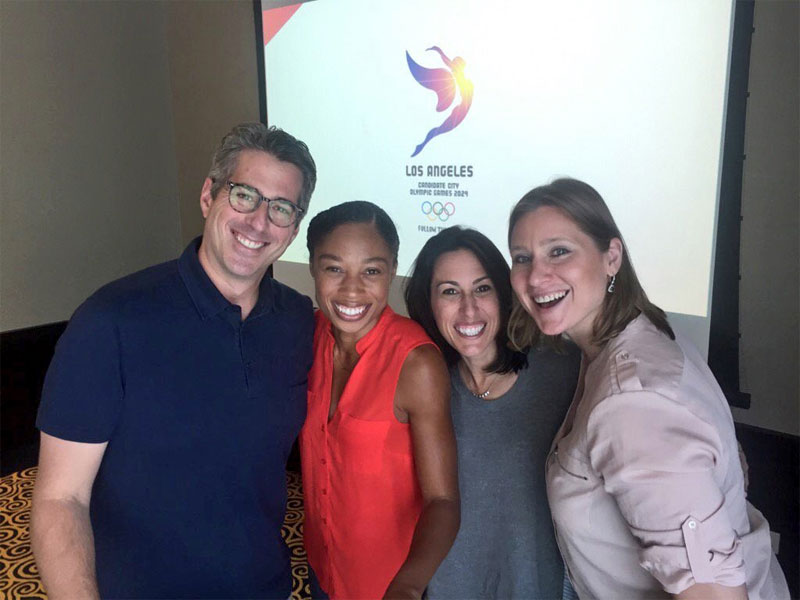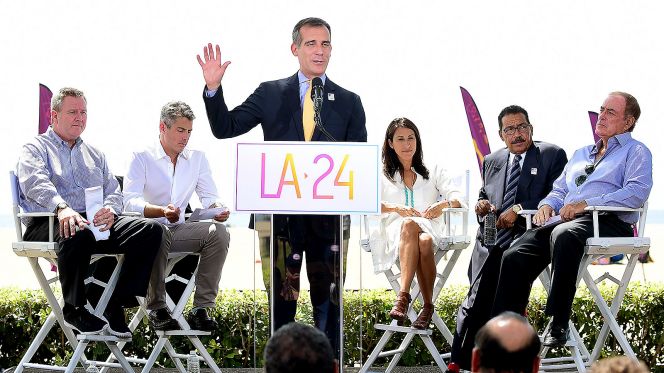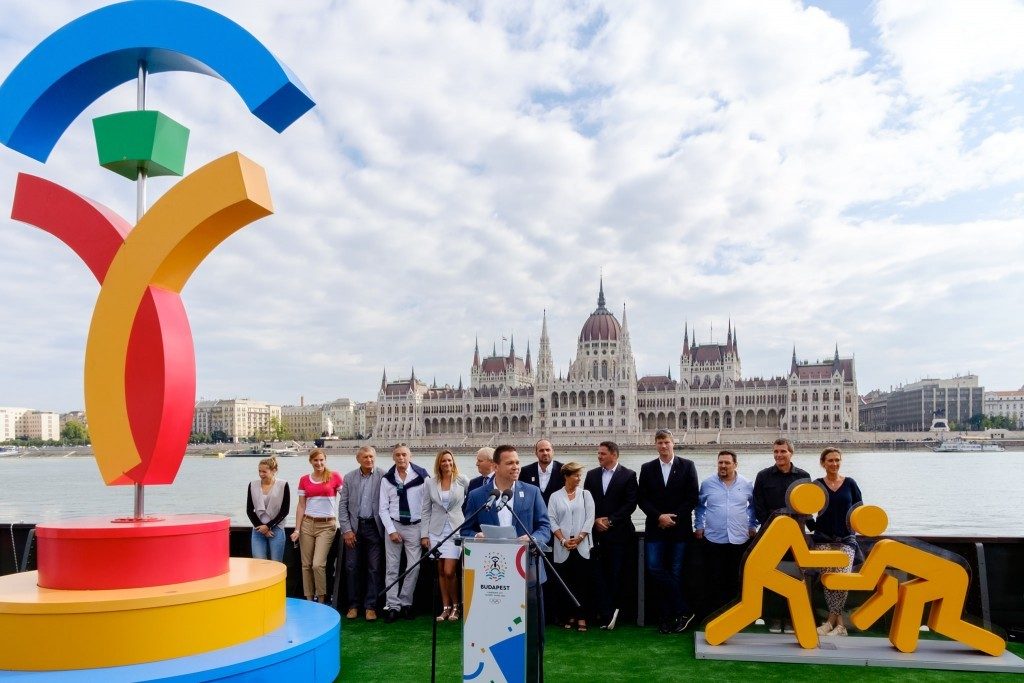
After simmering along gently over the last 12 months, the race for the 2024 Summer Olympic and Paralympic Games is beginning to boil up.
Sport has simply been too preoccupied with anti-doping and Rio 2016-induced hysteria to divert too much attention onto a contest for which runners and riders were still being decided.
Most of our focus until now has been on problems with the process: withdrawals from Boston and Hamburg followed by the “self-suspension” of Rome last month after a failure to gain Mayoral support. Clearly, the attempted Agenda 2020-induced reinvigoration rolled-out by the International Olympic Committee (IOC) in 2014 has had only a limited benefit so far.
But the three cities who are left showed during last week’s Association of National Olympic Committees (ANOC) General Assembly in Doha that they each have real potential.
All three gave their first 20 minute international presentation in the Qatari capital in an opening test seen as the Olympic bidding equivalent of the Iowa Caucus.
I somewhat hastily tweeted straight afterwards that I felt Los Angeles had done the best job of conveying a strong and effective message. This did not go down too well with one prominent Paris consultant, but it was clear many other observers felt the same.
Sun and the power of Hollywood shone throughout, but so did more powerful language about creativity, finance and – crucially – a lack of risk. “If you think about it,” smirked bid leader Casey Wasserman, “each Olympic and Paralympic Games is a five billion dollar start-up. And nobody does start-ups like the people in California.”

One perceived problem for Los Angeles surrounds the possible impact of soon-to-be-inaugurated United States President Donald Trump. In what many considered a masterstroke, this was addressed by six-time Olympic champion sprinter Allyson Felix who is also, without wanting to state the obvious, a black woman.
“We just finished our Presidential election, and some of you may question America’s commitment to its founding principles,” she said. “I have one message for you: Please don’t doubt us. America’s diversity is our greatest strength.”
The stark nature of her words reminded me of a similarly aggressive but effective speech given by Kazakhstan Prime Minister Karim Massimov in which he highlighted “real snow” when Almaty came so close to beating Beijing in the 2022 race last year. Confronting the elephant in the room head on.
Both were written by consultant turned Los Angeles 2024 marketing director Terrence Burns and, while it remains to be seen if such a direct approach will always be the most effective, it certainly made an impression here.
Two challenges surround the LA bid so far as I can see.
The first, which is more of a question mark than a specific problem at this stage, concerns their finances and technical plans. Unlike their two rivals, the Californian city neglected to publish their venue costs in their second candidature file submission last month. It was omitted to “protect LA24 proprietary information” although they claim the IOC have all the details and that they will be published in full by February, if not before.
They are also the only one of the three not yet to have finalized all of their venues. Homes for archery, modern pentathlon and mountain biking are still yet to be confirmed, although organizers insist announcements will be made soon. They are also planning to have just one overall operational budget for the Games because of an apparent absence of wider infrastructural costs. Their effort will also be “privately financed” with no dependence on the public purse.
But with Rio 2016 still awaiting state funds in order to make payments owed to staff and contractors, despite having made a similar claim about “no public money” being used, we would not be doing our job properly if we were not slightly skeptical.
A second issue concerns the perceived “arrogance” which has hindered previous American Olympic bids. Several IOC members have raised this as a challenge despite LA claims that they are different from past attempts. One even said that their bid presentation was so “smooth” and focused on “how California can help the IOC” that it came across as conceited.
There are two key figures within the bid team who can remedy this: IOC Athletes’ Commission chair and chief strategy officer, Angela Ruggiero, and chief executive Gene Sykes. Both come across as approachable, willing to listen and humble despite their high-level respective backgrounds as an Olympic ice hockey gold medal winner and a Goldman Sachs financial bigwig. Sykes’ style bears similarities with another Goldman Sachs man in London 2012 Organizing Committee chief executive Paul Deighton. He is also a Republican in a Democrat-dominated team, which could be key domestically.

Paris also have some highly effective figures within their bid team. Leading the way is co-chair Tony Estanguet. While Ruggiero appears to have grown into the role, the three-time canoe slalom Olympic champion turned Athletes’ Commission vice-chair is a natural.
“The best speaker across any presentation,” one IOC member said about him afterwards. His performance at yesterday’s World Anti-Doping Agency Foundation Board meeting showed he could have a sporting future far beyond Paris 2024.
I got a dose of the Gallic charm when asking Paris chief executive Etienne Thobois what he had learned from his previous role overseeing finances as a consultant for the Tokyo 2020 bid – which produced a budget city authorities now claim was grossly undercooked.
After Thobois had answered, Estanguet took over and said: “We have a collective responsibility on this point – this is key. We really have to take this point seriously if we want to be able to host any other events in the future. Really we will not cheat with the figures this time.”
Technically, their bid does seem strong and, as double Olympic judo champion Teddy Riner pointed-out during the presentation, 22 sports will all lie within a 10 kilometers radius of the Olympic and Paralympic Village. Their message pledging to ensure full-stadia was also a good one post-Rio.
While a California Legislative Analyst Office (LAO) report last week warned Los Angeles 2024 would only have a “neutral” economic impact for the region, Paris have prioritized legacy benefits. I spent a day with bid team members on a promotional trip to Marseille in September, one of many they have done across the country, and it seemed they are genuinely trying to involve all citizens, and particularly the young.
This came across in the speech of Estanguet’s fellow bid leader Bernard Lapasset in Doha. “The legacy of Paris 2024 will see sport as a driver of positive change,” he declared. “Education, health and social inclusion.”
Parisian Mayor Anne Hidalgo also outlined how her city had supposedly “taken the lead” on worldwide responses to issues such as climate change.
The only thing I would say here is that I have spent a fair bit of time with IOC members over the last three years and I have never once heard a single one talk about global warming – in fact it may be hard to find a group of 98 people with a worse carbon footprint. “Sustainability” may be one of the Olympic Movement’s favorite buzzwords, but I wonder if the LA messages about money and technology may be more powerful.
That said, it remains early stages and, with Paris’ consultants including Nick Varley, the architect of winning speeches for London 2012, Rio 2016 and Tokyo 2020, I suspect they will build-up their presentational momentum as we build towards the September 13 judgement day in Lima.

Budapest, of the three, have perhaps the most powerful message in the slogan: “right city at the right time”. In a strong performance in Doha, bid leader Balázs Fürjes did a good job of explaining how they offer an exciting alternative, but also – and this is key post Rio 2016 – how they can provide an option that can be trusted to succeed.
“We have the fundamentals in place,” he said “Because a mid-sized global city such as Budapest can offer a truly compact and intimate Games experience. A mid-sized city can deliver a Games at reasonable scale and reasonable cost. And this is a Games that will transform the city and leave a lasting legacy.
“A Games in Budapest sends the message that the Olympic Games are not simply for the mega-city but for mid-size cities.”
Hungary is the most successful medal winning nation never to have hosted the Olympic Games, remember, and they must now convince voters that the benefits of going somewhere new outweigh the risks.
My concern is that, in comparison with the other two, their lobbying effort appears weaker. Paris and Los Angeles leaders were everywhere in the Sheraton Hotel last week as they frantically hunted for the 50 or so IOC members present. Budapest were far less visible, and it was notable that when asking people about the race they, almost without exception, mentioned either the French or US bids first.
Hungarian IOC member Pal Schmitt was present, and it is vital they get well-connected old hands like him involved as much as possible. It was unfortunate new Athletes’ Commission member Daniel Gyurta was ill and unable to travel last week and, as a newbie, it will be hard for him to match Ruggiero or Estanguet when he does appear. Surely the likes of International Weightlifting Federation President Tamas Ajan should be helping out? And why not International Judo Federation counterpart, Marius Vizer, described usually as a Romanian-born Hungarian?
It is too early to count them out, and certainly they can emerge as a viable third option if rival efforts go sour – security fears for Paris and the “Trump” factor for LA appear the most likely reason for this. At present, however, it appears Budapest have some catching up to do.
Bizarrely, the Agenda 2020 reforms introduced by the IOC ostensibly to reduce costs and stop richer bids gaining an advantage have backfired. Because they have less formal opportunities to present and showcase themselves than before, it has become harder for Budapest to stand-out and make up the ground as the importance of lobbying becomes ever more vital.
All three bids, it is worth pointing out, constantly moan to us about the IOC’s increasingly dictatorial restrictions on promoting themselves. Latest measures included journalists being banned from taking photos as they presented… (with the IOC doing their usual trick of getting ANOC to tell the journalists this rather than do it themselves).
Perhaps IOC President Thomas Bach should think about this the next time he claims, as he did in Doha, that Agenda 2020 has saved the Games and was directly responsible for all three bids being launched.
It is nigh-on impossible to pick a favorite at this stage.
Paris insiders are claiming that, to quote rapper Eminem, this is their “one shot, one opportunity.” They claim that if they are not successful this time, the French capital will cease trying whereas, if they win, another US city would be likely to bid for 2028. On the other hand, there are important commercial and financial incentives for choosing California to the extent that the IOC will be both a winner and a loser whoever wins.
It will also be interesting to see whether Bach or ANOC President Sheikh Ahmad Al-Fahad Al-Sabah clearly align themselves to one bid and, if they do, how many members will listen.
It should be a fascinating 10 months building up to the vote in Lima.
By Nick Butler
Republished with permission from insidethegames.biz.